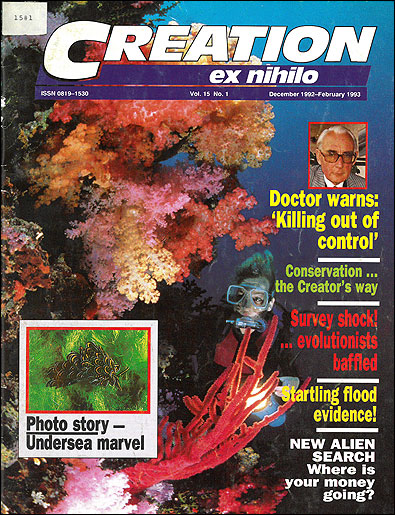Creation in the jungle
A third of the Angave population of only 900 gathered for the feast to celebrate the arrival of the New Testament. But most were there just for the feast, and even then not everyone was happy. Long-standing grievances prevented some families from eating with others.
No one from the southern valley clan came, because a week earlier one of their women had been killed by the clan living on the plateau, and that matter was still not settled.
As Wycliffe Bible translator Rick Speece thought about what he should share at the dedication, he knew he would have to begin by arguing convincingly about the existence of God, for most Angave have believed that creation is self-existent and thus there is no creator to whom they are accountable. If Rick’s argument was not convincing, anything he would say about the importance of reading God’s Word would be useless. And in order to gain listening ears he would have to employ the Angave techniques of persuasion. He would have to use parables.
When all the fire pits had been tilled with food, covered and left to cook, Angave co-translator Seavayit Rakayo climbed on to a boulder and began to speak. He said, ‘I want to make it clear to you why we are having this feast today. It is because of this book. You are saying that because it cannot be eaten, nor can it keep us warm, of what use is it? But I want to tell you that this book tells us about God and how He sent His Son to earth to die for us.’
Rakayo spoke for 40 minutes, exhorting his people to turn to God. Then Rick took his place on the boulder. He began with a parable. ‘Once when I was hunting deep in the jungle, far from any path, I saw an arrow on the ground. As there was no one else around, I thought the arrow must have come to be there all by itself.’
He asked his hearers if that was a reasonable understanding. In true Angave fashion, several shouted that only a crazy person would think that an arrow could come to be there all by itself. ‘Everyone knows that arrows are made by someone’, they yelled. And one added, ‘You should have realized there had been someone hunting there before you, because the presence of the arrow meant that its maker had been there.’ Then Rick asked, ‘If I must conclude that there is a maker when I sec an arrow, then surely I must also conclude that there is a maker when I see the mountains, trees and animals. There is indeed a Maker, and His name is God. And even though we cannot see Him here we should not simply conclude that He doesn’t exist.’
The people began to understand his parable about why there has to be a Creator.
Through the efforts of the translation team—Rick and Marilyn Speece and Seavayit Rakayo—the New Testament is now being read in a number of Angave homes, and is being used by believers in regular Bible studies.
(Adapted from Beyond Words. Wycliffe Bible Translators. Used with permission.)


Readers’ comments
Comments are automatically closed 14 days after publication.